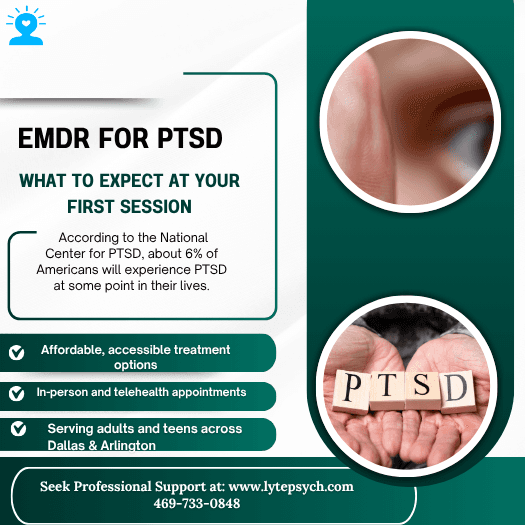Mon Nov 03 2025
EMDR for PTSD: What to Expect at Your First Session at Lyte Psychiatry (Best Adults and Adolescents therapist Near You) Dallas & Arlington, TX

EMDR for PTSD: What to Expect at Your First Session
at Lyte Psychiatry (Best Adults and Adolescents Therapist Near You in Dallas & Arlington, TX)
Understanding EMDR and Its Role in PTSD Recovery
Post-Traumatic Stress Disorder (PTSD) affects millions of adults and adolescents across the United States, often resulting from distressing events such as accidents, abuse, loss, or exposure to violence. According to the National Center for PTSD, about 6% of Americans will experience PTSD at some point in their lives — and for many, traditional talk therapy alone doesn’t fully relieve the distressing symptoms.
That’s where Eye Movement Desensitization and Reprocessing (EMDR) therapy comes in.
At Lyte Psychiatry, serving the Dallas and Arlington, TX communities, EMDR is one of the most effective, evidence-based treatments we use to help patients overcome trauma. Whether you’re an adult managing years of painful memories or an adolescent struggling with anxiety or flashbacks, EMDR can help your brain reprocess trauma in a healthier way.
What Is EMDR Therapy?
How EMDR Works
EMDR stands for Eye Movement Desensitization and Reprocessing, a psychotherapy approach developed by Dr. Francine Shapiro in the late 1980s. Unlike traditional talk therapy, EMDR focuses on helping the brain reprocess traumatic memories rather than simply discussing them.
The therapist guides you through recalling distressing experiences while simultaneously engaging both sides of your brain often through eye movements, tapping, or auditory tones. This process helps “unstick” painful memories and allows the brain to integrate them in a more adaptive way.
Scientific Evidence Behind EMDR
Research consistently supports EMDR as a front-line treatment for trauma:
Studies show that 77–90% of trauma survivors report a significant reduction in symptoms after just 6–12 EMDR sessions.
What to Expect at Your First EMDR Session
Initial Assessment and Goal Setting
Your first EMDR session at Lyte Psychiatry will begin with a comprehensive assessment. Your therapist will discuss your mental health history, trauma experiences, and current symptoms. Together, you’ll identify specific memories or triggers that cause distress, as well as the goals you hope to achieve through EMDR.
Building Safety and Trust
Before reprocessing begins, your therapist ensures that you feel emotionally safe and grounded. You’ll learn stabilization techniques such as deep breathing or mindfulness to help regulate emotions if you feel overwhelmed during future sessions.
Explaining the EMDR Process
Your therapist will explain how EMDR works step by step, what bilateral stimulation feels like, and what reactions you might experience. The goal is to demystify the process and ensure you feel comfortable and informed.
At Lyte Psychiatry, we tailor every EMDR plan to the individual whether you’re a teen facing trauma-related anxiety or an adult coping with years of suppressed memories.
The Phases of EMDR Therapy
History Taking
This phase involves identifying traumatic experiences and assessing how they affect your daily life. The therapist gathers background information and helps prioritize which memories to target first.
Preparation
You’ll learn emotional regulation and grounding skills to ensure you can manage distress during reprocessing. This builds confidence and trust in the therapeutic process.
Assessment and Desensitization
This is where EMDR’s core mechanism takes place. You’ll recall a specific memory while focusing on bilateral stimulation (eye movements, tapping, or sounds). Over time, the emotional charge linked to that memory begins to fade.
Installation and Body Scan
Once the distress decreases, your therapist helps reinforce positive beliefs (like “I am safe now” or “I am strong”) while ensuring your body no longer holds physical tension associated with trauma.
Benefits of EMDR for Adults and Adolescents
Faster Healing and Long-Lasting Results
Minimal Verbal Processing
For individuals who find it difficult to talk about trauma, EMDR offers a healing path without needing to relive every detail. The focus is on how the memory feels in the present, not the event itself.
Suitable for All Ages
At Lyte Psychiatry, we use EMDR with both adults and adolescents. For teens, EMDR can help address trauma from bullying, accidents, or family conflict, while for adults, it’s effective for complex trauma, abuse recovery, and PTSD linked to life-altering experiences.
Improved Emotional Regulation
Many patients report decreased anxiety, better sleep, reduced nightmares, and enhanced concentration after EMDR. It helps the brain file traumatic memories properly — so they no longer intrude on daily life.
Take the First Step Toward Healing at Lyte Psychiatry (Affordable Therapist and Psychiatrist Near You)
If trauma or painful memories are holding you back, healing is possible — and you don’t have to go through it alone.
Contact Lyte Psychiatry today to schedule your EMDR consultation and take the first step toward freedom from trauma.
FAQs About EMDR Therapy
Q: Is EMDR safe?
A: Yes. EMDR is backed by decades of clinical research and is safe when administered by a trained professional. At Lyte Psychiatry, all EMDR therapists are certified and trauma-informed.
Q: How many sessions will I need?
A: The number of sessions varies depending on your history and trauma type. Most clients see improvement in 6–12 sessions, though complex cases may take longer.
Q: What if I feel overwhelmed during EMDR?
A: Your therapist will teach grounding and self-soothing techniques before any trauma processing begins. You remain in control throughout every step of therapy.
Q: Does EMDR work for anxiety or depression?
A: Yes. EMDR can effectively reduce symptoms of anxiety, panic attacks, and depression, especially when these issues are linked to unresolved trauma.
Q: Is EMDR covered by insurance?
A: Many insurance plans cover EMDR as a recognized treatment for PTSD. Lyte Psychiatry’s staff can help you verify coverage and explore affordable payment options.